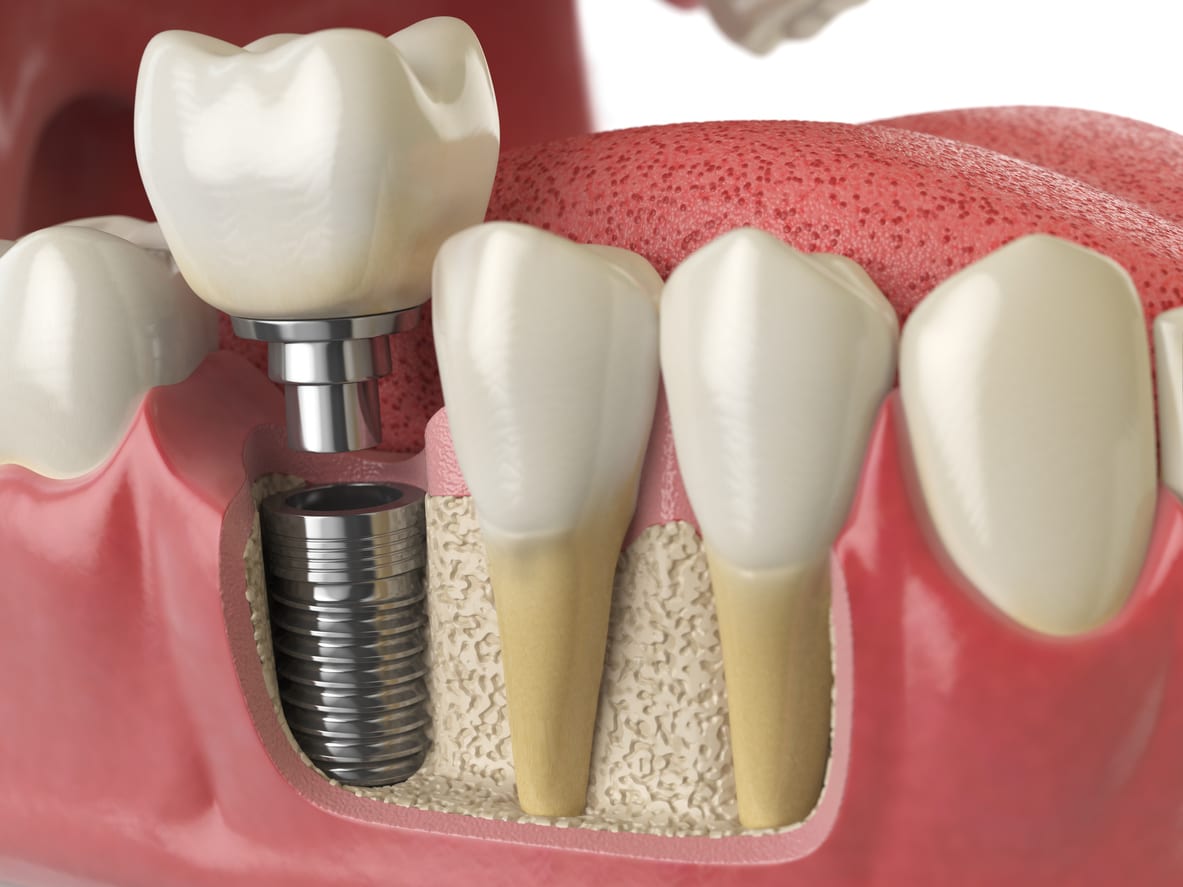Dental Implants in Simi Valley & Moorpark, CA

Dental implants are an option by Casey Patterson, DDS in Simi Valley, CA to replace missing teeth and provide a fixed solution to removable dentures. Dental implants are natural-looking replacement teeth that are fixed in the jaw. Dental implants provide an option to correct the most troublesome cases associated with missing teeth and ill-fitting dentures.
After an artificial tooth root is made of titanium, an implant is surgically placed into the jawbone to support tooth-replacement structures such as crowns, bridges, and dentures. While the implant mimics the root of the tooth, the replacement structure looks and feels just like a natural tooth, providing patients with a permanent solution that replicates the fit and feel of natural teeth. Interested in learning more? Call (805) 584-1194 today to book a one-on-one dental implant consult with Dr. Patterson!
Contact Us Today to Schedule an Appointment
Why should I replace a missing tooth?
People mistakenly think missing teeth are simply a cosmetic issue, and if the missing tooth isn’t in an obvious location, they often opt to not replace the tooth or teeth. Beyond the cosmetic issues of a gap in your teeth, there are dental problems:
- The teeth surrounding the missing tooth or teeth no longer have pressure on them to stay in place, so they will, over time, move into the gap. This movement can change your bite and overall alignment.
- When you chew or bite, a good deal of force in involved. The tooth takes this energy and transfers it down the tooth into the jawbone beneath. This energy signals the jawbone to build new bone mass, keeping it healthy. When a tooth is missing, that energy doesn’t enter the jawbone and it begins to deteriorate. Over time, this leads to a sunken appearance in the area as the jawbone collapses inward.
- A missing back tooth can keep a person from eating certain foods, due to the difficulty in chewing them. This can lead to nutritional issues.
- Missing teeth can create whistling sounds when speaking.
Dental implants correct these issues. They keep the adjacent teeth in place. They transfer bite energy down into the jawbone, just as natural teeth do. They allow the person to eat any foods again. They give the patient back a full smile.
What is a dental implant?
Dental implants are far and away the best option for replacing a missing tooth or two or for providing anchors to give stability to full arches of dentures.
The dental implant gets its name from the implant base. This tapered, screw-shaped prosthetic is placed in the area of the jaw formerly occupied by the natural tooth root. Because the body accepts titanium (it is the material used to make artificial hips, knees and other joints), the jawbone begins to grow around the implant. In about 10-12 weeks the jawbone will completely integrate the implant, making it, basically, a part of the jaw. A post, called the abutment, is then attached to the implant and a tooth colored crown is attached to the abutment. Now, the complete dental implant functions and feels just like a natural tooth, and it will often last the remainder of the patient’s life.
What are the Benefits of Dental Implants?
Dental implants have many benefits over other tooth-replacement methods.
- Enhanced Esthetics
Dental implants are placed within the gums and the crowns that are attached to them emerge in a manner similar to a natural tooth. This offers a more realistic and natural look compared to other alternatives. - Reduction Of Bone Loss
When a tooth is lost, the supporting bone structure gradually recedes over time. Dental implants integrate with the jawbone and stimulate its preservation, allowing the bone to stay healthy and intact while maintaining natural facial contours and appearance. - Preservation of Adjacent Teeth
Other methods like fixed bridges must be anchored to adjacent teeth, unnecessarily sacrificing their quality and health. Dental implants are independent and do not rely on the support of other teeth, thus providing the ability to preserve the good teeth. - Easier Eating
As the jawbone shrinks, chewing efficiency is reduced, making it difficult to eat certain foods. Dental implants can restore chewing efficiency comparable to that of natural teeth, allowing patients to eat their favorite foods with confidence and without discomfort.
What can dental implants be used to fix?
Dental implants are the best option for replacing a missing tooth or a couple of teeth. They are effective when used as anchors for crowns, bridges or full-arch dentures. Especially with dentures, implants provide the stability that conventional dentures have always lacked. Implants keep the denture from slipping when eating or talking. They give the patient much more confidence.
Am I a candidate for a dental implant?
If you’re missing a tooth or a couple of teeth, or if you have a tooth that is badly decayed or damaged and needs extraction, a dental implant is the best way to replace that tooth or teeth. There is no age limit on implants, although the research is incomplete for patients under 17 years old.
The only limiting factor is the health of your jawbone under and around your missing tooth. If you’ve been missing a number of teeth for a period of time, your jawbone could have deteriorated in that area. This happens because the jaw no longer receives the bite force energy that transfers down from the teeth into the jawbone. This energy triggers the jawbone to continually shed old cells and build new bone mass. If you’ve lost bone mass, this doesn’t mean you cannot have a dental implant; it simply means that Dr. Patterson’s oral surgeon or periodontist may have to build up the area with bone grafting material first. This is not a difficult process. In fact, if you have some bone loss, but not too much, Dr. Patterson’s oral surgeon or periodontist can place the bone graft material and the titanium implant base at the same time.
How is a Dental Implant Procedure Performed?

- Dental health
- Condition and quality of the jawbone
- Number of teeth involved
Dental implant restorations usually take place over a few appointments and involve several steps.
First, a dentist or oral surgeon will cut into the gum to expose the bone. One or more dental implants are precisely placed into the jawbone to mirror the location of the root of the missing natural tooth. After appropriate healing has taken place to allow for the dental implant to fuse within the bone, impressions of the teeth and bite are taken to custom-fabricate a connector post or abutment, and crown. At the final appointment, the oral surgeon reopens the gum to expose the implant. The abutment and crown are attached to the implant, completing the process.
Some patients may experience minor soreness after getting dental implants, which can be treated with over the counter ibuprofen medication.
Is there recovery time when getting dental implants?
Receiving an implant from Dr. Patterson and his oral surgeon or periodontist is a three-step process. The first step is placing the implant into the jawbone. To do so, Dr. Patterson’s oral surgeon or periodontist needs to make a small opening in the gum tissue to access the jawbone. Once the implant is placed, the patient needs to let the gum opening heal for several days. This isn’t overly uncomfortable, but the patient will need to take it easy and eat a soft diet for a few days. Dr. Patterson’s oral surgeon or periodontist will follow your progress for 10-12 weeks until the healing period is complete.
The second step, 10-12 weeks after implant placement, is taking impressions for the laboratory to begin fabrication of your final restoration. This procedure is done by Dr. Patterson in his office.
The final step, usually 2-3 weeks later, is placing the final restoration onto the implant, which is painless and requires no recovery afterwards. The patient can begin using his or her new dental implant immediately. This procedure is also completed in Dr. Patterson’s office.
What Results Can I Expect from Dental Implants?
Patients receive all the benefits of natural teeth with their dental implants. It is important to continue good oral hygiene with the implants to prevent bacteria buildup, which can cause gum disease or bone loss.
Are Dental Implants Painful?
Not really, most patients return to normal activity within a day or two. During this time, the patient may experience some mild discomfort, but it is manageable with over-the-counter pain medication. Because the jawbone doesn’t have nerves, placing the implant base into the jaw doesn’t hurt. Patients are surprised by how little discomfort there is with the entire implant process.
How long do dental implants last?
Dental implants have an incredible success rate, over 98 percent. These amazing prosthetics are also the most durable dental device. Most dental implants last the remainder of the patient’s life.
Does insurance cover dental implants?
Dental insurance plans vary widely when it comes to covering dental implants. This is odd considering dental implants usually present a final solution to the tooth replacement. They won’t need any additional care and the patient won’t have to replace them.
Some plans cover aspects of dental implants, especially if the tooth loss has led to other problems. Some plans fully cover implants.
You should call your dental insurance provider to see what your plan specifically covers or does not cover. At Dr. Patterson’s office we work with the insurance carriers to attain the highest levels of coverage possible for our patients.
Call Dr. Patterson For Dental Implants in Simi Valley!
Dr. Casey Patterson can answer any questions you have regarding dental implants, and can assist you with determine whether you are a candidate. Be sure to call our Simi Valley office at (805) 584-1194 or fill out the appointment request form in our contact page. Our practice looks forward to serving you!



